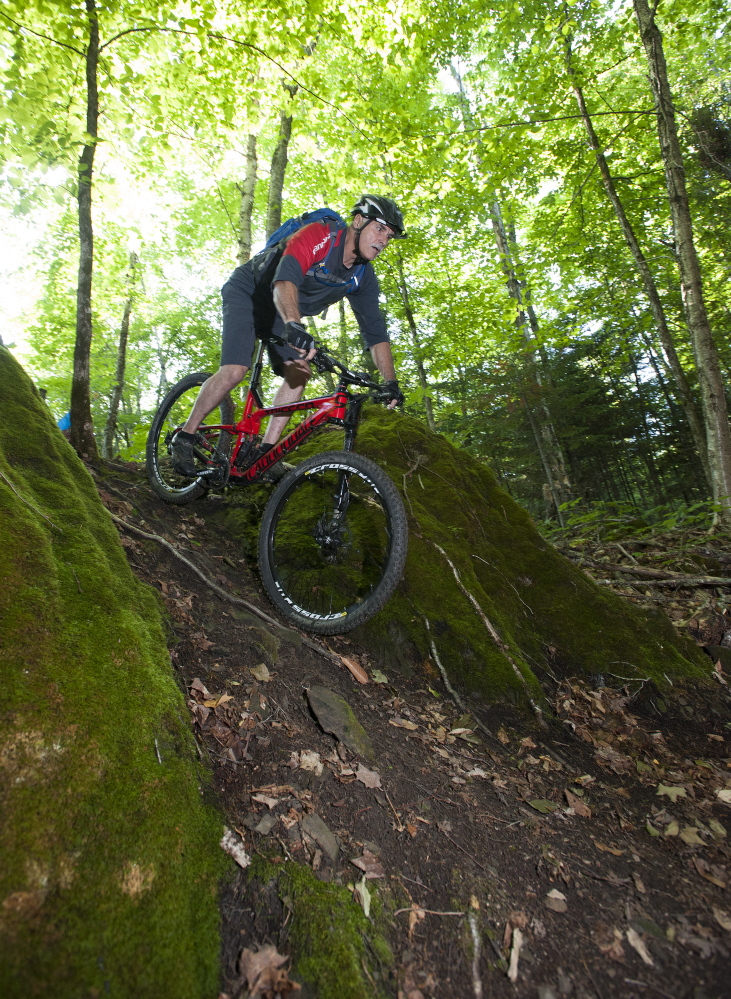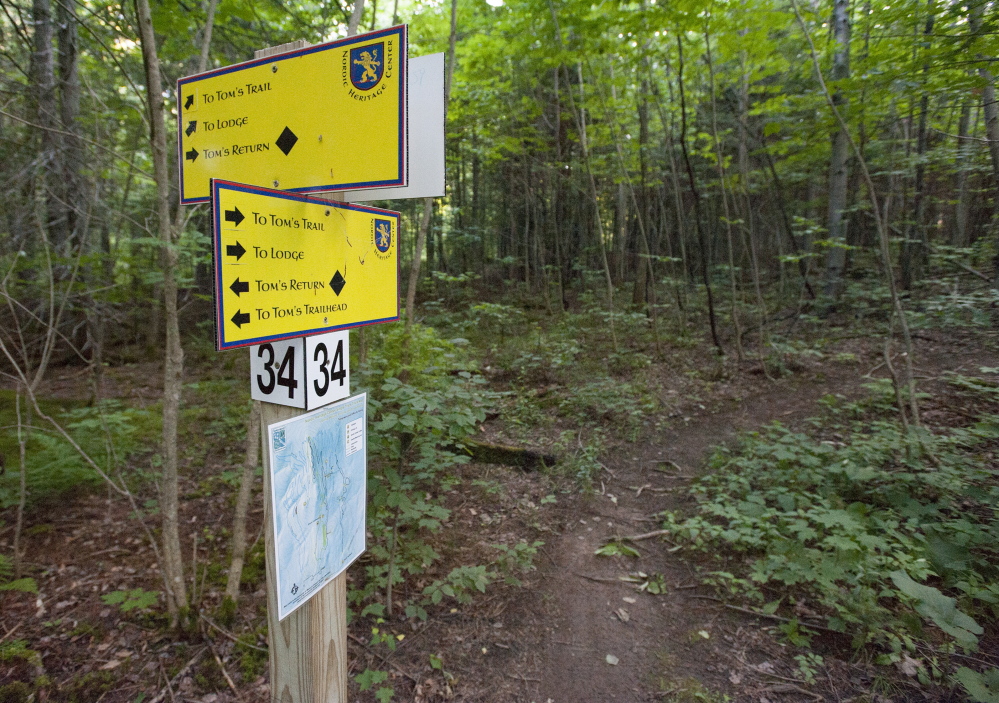PRESQUE ISLE — The Nordic Heritage Center on the outskirts of Presque Isle is like a hidden world. A 10-minute drive uphill from the town’s main street, the red lodge rises above surrounding forestland like a welcoming castle. First designed as a world-class biathlon and Nordic ski racing center, the center has transformed in the last decade into a mountain-bike destination.
It offers 22 miles of single-track mountain bike trails, a lodge with showers, saunas, and a kitchen that are all open at no cost to the public. The trails are maintained and run by the nonprofit club that supports the center, the Nordic Heritage Center Sports Club. This remote, wild location at the northern tip of Maine distinguishes the Heritage Center mountain bike trail network. It’s also the reason it’s less used than other mountain bike trail systems in the state, said Tom Chasse, a member of the Heritage center’s steering committee.
This weekend the center’s Nordic Trail Festival is expected to draw 100 mountain bikers from across New England and nearby Canadian provinces. It’s a fundraiser to help support the center, but it’s also a way to showcase an ever-expanding trail network that many believe holds great potential.
“Northern Maine could be one of those places that transitions from an economy of the past to an economy of the 21st century: a recreation-based economy,” said Rich Edwards, the associate trail director of the International Mountain Bike Association in Colorado. Edwards has helped design networks in Australia, the Czech Republic, Norway and across the United States in this growing sport.
According to Edwards, the landscape around Presque Isle coupled with community involvement are key assets needed to create a notable mountain bike destination.
“The reason that people will come to this park is because of the quality of the trails and the commitment by the community,” Edwards said. “They buy into the concept we teach, that you have to do it right from the start. I first trained them in 2003 and each time I went back, I was impressed by the level of work they had done. And the rock work in Presque Isle has appeared in our publications and presentations. It’s very unique.”
Originally one of the Maine Winter Sports Center’s campuses, the Heritage Center is no longer affiliated with the sports center. But it continues to receive funding from the Libra Foundation, which created the Maine Winter Sports Center and funded it for 15 years until that funding stopped in 2014.
Libra, a Portland-based philanthropic foundation that helps support nonprofits, continues to fund the two biathlon and ski centers it created: the Presque Isle Heritage Center and the Fort Kent Outdoors Center.
“(The Heritage Center) was first funded as an epicenter of Nordic and biathlon skiing back in the 2000s. That was the thinking and it continues to be,” said Libra president Craig Denekas. “When you see the 400 to 500 volunteers who work on the World Cup events (there), it’s a huge undertaking. Holding World Cup events is great, but frankly those are a way to fund the community center. This center is a draw to the area. It makes it fun to raise a family there.”
Libra funds both centers, providing grants of $50,000 a year for each facility. An army of local volunteers staffs both centers and work to raise the other half of each centers’ roughly $100,000 annual operating budget.
It’s one of the homegrown features Chasse is most proud of when giving a tour of the trail network in Presque Isle.
The co-owner of a mountain bike shop in town, Chasse said the trails on the east side of the lodge hold 12 miles of rocks and boulders, while the west-side trails consist of eight miles of fast and flowing single track. Most are named for local riders. Volunteers now are working toward a downhill course. “I ran into a guy riding here from Louisiana. He was literally riding all the trails in Maine. People come here from all over,” said Chasse, 61.
The trails, however, are used mostly by riders who live around Presque Isle, Bangor or the nearby provinces. Two evenings a week group rides draw anywhere from two to 20 riders. The regulars prefer to ride fast, racing through the windy, narrow trees, but are equally happy to wait for newcomers.
Marcel Daigle of Caribou was one three years ago. After moving to the area while job searching, he had time on his hands and decided to get on his bike for the first time in years. The Heritage Center trails called to him.
“I was just starting back but these are the best trails I’ve ridden,” said Daigle, 54. “There is a lot of variety, and they’re rocky with short climbs and technical sections.”
Chris Miller of Presque Isle is one of the original volunteers. He’s proud of the work he and his fellow riders have done but realizes Presque Isle still remains an outpost for attracting mountain bikers.
“The festival needs to grow a little more before it has an impact,” said Miller, 45. “But when people from away are riding here, and stop and say they’re enjoying the trails, there is a sense of accomplishment.”
Copy the Story Link
Send questions/comments to the editors.





Success. Please wait for the page to reload. If the page does not reload within 5 seconds, please refresh the page.
Enter your email and password to access comments.
Hi, to comment on stories you must . This profile is in addition to your subscription and website login.
Already have a commenting profile? .
Invalid username/password.
Please check your email to confirm and complete your registration.
Only subscribers are eligible to post comments. Please subscribe or login first for digital access. Here’s why.
Use the form below to reset your password. When you've submitted your account email, we will send an email with a reset code.